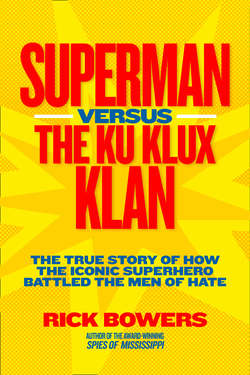Читать книгу Superman versus the Ku Klux Klan: The True Story of How the Iconic Superhero Battled the Men of Hate - Richard Bowers - Страница 11
* CHAPTER 2 * KINDRED SPIRITS & CREATIVE FORCES
ОглавлениеJOE SHUSTER WAS A fellow science fiction fanatic, a talented illustrator, and another skinny, bashful kid with thick glasses and no girlfriends. Jerry and Joe were kindred spirits and tireless collaborators. Sequestered in an attic work space after school and on weekends, the boys spent hours talking about science fiction, conjuring up story ideas, and drawing illustrations. Over time they would create a world of mad scientists and futuristic space travelers, smooth-talking detectives and supernatural beings. Although he could draw a bit, Jerry generally took the role of writer, his more assertive personality driving the action. Writing in pithy sentences that could be squeezed into small narrative boxes and thought bubbles, he would conjure the concept, plot the story line, and develop the narrative. As the illustrator, Joe would envision the characters and scenes and then put pencil to paper as he brought the characters to life on cheap, brown butcher paper laid across his mother’s favorite cutting board.
Early in 1932 Jerry and Joe went to work on their own typewritten magazine titled Science Fiction: The Advanced Guard of Future Civilization. Once they had their densely typed, roughly illustrated master copy in hand, they dashed off to the library to mimeograph copies and began mailing them to fellow fans within the free-ranging science fiction network. Science Fiction would also be sent to the publishers of the best zines, in hopes that one of them would purchase a piece of content, or, at least, recognize the talent of the young creators.
The third edition of Science Fiction featured a story entitled “The Reign of the Super-Man,” in which a bald, diabolical chemist sets out to use a substance derived from a meteor to turn himself into an evil genius with the power to dominate the world. Although most of the stories in Science Fiction were written by Jerry and illustrated by Joe, “The Reign of the Super-Man” was signed with the byline Herbert Fine. The two amateurs probably thought the pen name was a professional touch that would create the illusion that there was another writer in their limited stable of contributors. Plus, it added a bit of protection against any prejudiced publishers who might like the story but suspect that the writers were Jewish based on their real names.
Jerry and Joe’s “The Reign of the Super-Man” played off the grim realities of the Great Depression. In the story, treacherous Professor Smalley lures destitute, homeless men from soup kitchens to serve as guinea pigs for his hideous experiments: “With a contemptuous sneer on his face, Professor Smalley watched the wretched unfortunates file past him. To him, who had come of rich parents and had never been forced to face the rigors of life, the miserableness of these men seemed deserved.”
It was a good tale, but it was not the page-turner the duo had hoped for. What was it? Jerry and Joe would tackle that question later. The pair were in what should have been their last year at Glenville High, and the world of work was looming ahead—although they would both end up repeating that year because they lacked the grades to graduate.
In addition to hanging out with Joe, Jerry loved to spend time with his dad, Mitchell, who supported his youngest son’s creative endeavors. Maybe this support stemmed from Mitchell’s own abandoned dream of being a painter. Or perhaps he was just going easier on his youngest child than he had on the others, who had been expected to work part-time at the haberdashery, to do well in school, and to prepare to find good jobs (the boys) or good husbands (the girls). Then, in an instant, the family’s life changed forever.
On June 2, 1932, just after closing time, a neighboring merchant noticed that the haberdashery’s door was ajar. The interior lights were on, but Mitchell Siegel was nowhere in sight. The concerned shopkeeper pushed open the door and found Mitchell sprawled on the floor behind the counter—dead. The money in the cash register was gone, as were the three thugs who had robbed him. Initial police reports suggested that Siegel had been shot in the chest and found in a pool of blood behind the cash register. The coroner’s report later amended the scenario: Mitchell had suffered a fatal heart attack during the robbery. Either way, the Siegel family would never be the same.
Jerry’s mother fell into a deep depression. Her message to the children was cold and absolute: Never mention the robbery to anyone. All that the neighbors needed to know was that their father had died of a heart attack. Period. Relatives flocked to Sarah’s side, tried to console the kids, made sure that the bills were paid, and shook their heads over the tragedy. With the Great Depression bearing down, Mitchell’s income gone, and money tighter than ever, the family did the best they could. Devastated by the loss of his dad, Jerry withdrew even more into his science fiction world.
But a fire burned within him. He was more determined than ever to make it in the publishing business. He would work tirelessly to honor the memory of his hardworking father. He had no way of knowing that success was not far beyond the horizon. The shy, grieving, self-conscious, seemingly powerless teen could not foresee that his imagination would conjure up a muscular, all-powerful, super human who could deflect bullets, bend steel in his bare hands, soar into the sky, and protect the little guy from thugs and hoodlums like those who had caused his father’s death.
